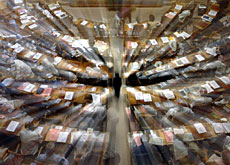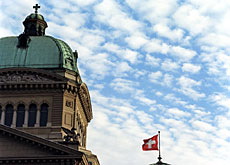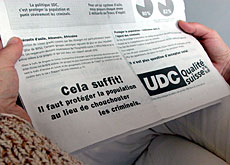Election confirms polarisation of politics

Sunday's big win by the rightwing People’s Party has confirmed earlier predictions of a polarisation of Swiss politics into Left and Right.
The centre-left Social Democrats held on to second place, but the two main centre-right parties suffered significant losses.
“It’s an astonishing result for Swiss People’s Party,” political analyst Andreas Ladner told swissinfo. “It’s a victory for the Right.”
The People’s Party won 55 out of 200 seats in the House of Representatives, while the centre-left Social Democrats have 52 seats, according to final results released on Monday.
“Not only did the People’s Party win more seats than expected, but the Centre-right also lost a considerable number of seats,” explained Ladner.
Hardline
In view of the results, it was “the right moment” for the party to ask for a second cabinet seat, Ladner added.
On Sunday the People’s Party demanded that a second cabinet seat be given to its hardline figurehead, Christoph Blocher, in a move that would change Switzerland’s power-sharing arrangement – the “Magic Formula” – established in 1959.
The People’s Party currently holds one cabinet seat, while the other three main parties each hold two.
“It’s possible that other parties would elect Blocher in the hope that the People’s Party becomes completely integrated [in politics] and is no longer an opposition movement,” commented Ladner.
“But it’s uncommon for a party to demand another seat or threaten to leave the government.”
But Clive Church, a specialist on Swiss politics at the University of Kent, stressed that the People’s Party’s 26.6 per cent share of the vote did not give them the right to “dictate”.
“Seeing that all parties vote on the composition of government, it’s quite possible they could demand a seat and not get it,” he explained.
Green gains
One of the biggest winners in relative terms was the Green Party, gaining four more seats.
“The four extra seats the Greens [look set] to win are very surprising,” commented Church.
“They are the newest of the parties and they’ve become more pro-European and agree with the Social Democrats on a large number of social issues.”
The main centre-right parties, the Radicals and Christian Democrats, lost 14 seats between them and will remain the third and fourth largest in the House of Representatives.
“I think it’s going to be very difficult to reinforce the Centre,” said Church. “They’ll have to reinvent themselves and will each have to agree on a [political] programme.”
Church said a problem afflicting both parties was that they housed a “broad church” of parliamentarians with differing political leanings.
“The Christian Democrats were originally a Catholic conservative party, and have tried unsuccessfully to move to become less tied to the Church,” he explained.
Reinventing the Centre
In the run-up to the vote, the Christian Democrats chose to adopt a broad political agenda, focusing on a range of lighter issues – to their detriment.
Meanwhile, polls suggest the Radicals suffered most from the electorate’s worries over the future of state pensions – a key concern for voters.
In May, Interior Minister Pascal Couchepin, who is one of two Radical Party members of the government, attracted much criticism for his blueprint for increasing the retirement age to 67 by 2025.
The Radicals – traditionally seen as the party of business – also had a bad start to the year when they were forced to elect a new president, after their previous leader, Gerold Bührer, became involved in a scandal involving the insurer, Swiss Life.
swissinfo, Vanessa Mock
Parliamentarians in the House of Representatives are elected by proportional representation.
The Senate is largely chosen by the first-past-the-post system.
The number of parliamentarians each canton sends to the 200-member House of Representatives depends on the size of the canton’s population.
This is not the case with Senate, where each canton sends two senators and each half canton sends one. There are 46 senators in total.

In compliance with the JTI standards
More: SWI swissinfo.ch certified by the Journalism Trust Initiative










You can find an overview of ongoing debates with our journalists here . Please join us!
If you want to start a conversation about a topic raised in this article or want to report factual errors, email us at english@swissinfo.ch.